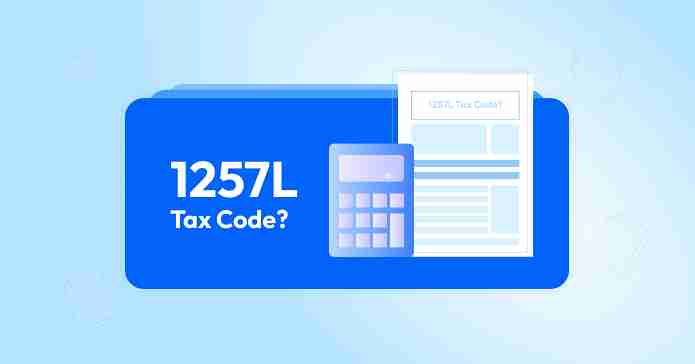


Learn what the 1257L tax code means, how it affects your pay, and how Payroll Services in Kent can ensure accurate tax deductions.
Tax codes are an essential part of the UK’s Pay As You Earn (PAYE) system. They determine how much Income Tax is deducted from your salary, pension, or other earnings. One of the most common tax codes you’ll encounter is 1257L. While it might look like a random combination of numbers and letters on your payslip, it actually conveys important information about your personal allowance and tax obligations. Understanding this tax code is crucial for all employees, ensuring you pay the correct amount of tax and avoid unnecessary overpayments or underpayments.
This guide covers everything you need to know about the 1257L tax code, including how it works, who it applies to, what changes could affect it, and why professional payroll management matters.
The 1257L tax code is used by HMRC for the majority of employees in the UK for the tax year 2023/24. Breaking it down:
1257 refers to the tax-free personal allowance of £12,570. This is the amount of income you can earn in a year before paying Income Tax.
L indicates that you are entitled to the standard personal allowance.
Essentially, the 1257L tax code tells your employer how much of your income is tax-free and ensures that your PAYE deductions are calculated correctly.
For example, if you earn £30,000 annually and your tax-free allowance is £12,570, the tax code ensures you are only taxed on £17,430 (£30,000 – £12,570).
Your tax-free allowance is applied throughout the year. If you are paid monthly, your employer divides your personal allowance by 12 and subtracts it from your monthly income to calculate taxable earnings.
Annual salary: £30,000
Tax-free allowance: £12,570
Taxable income: £30,000 – £12,570 = £17,430
Income Tax is applied according to the relevant bands:
20% on the first £37,700 of taxable income
40% on taxable income above £37,700
45% on taxable income above £125,140
For monthly payroll:
Monthly salary: £2,500
Monthly personal allowance: £1,047.50 (£12,570 ÷ 12)
Taxable monthly income: £2,500 – £1,047.50 = £1,452.50
The employer applies the PAYE system to deduct Income Tax from this taxable income and submits the information to HMRC.
The 1257L tax code applies to most employees who meet the following conditions:
Single Job or Main Source of Income – Employees who have one primary employment or main pension.
Full Personal Allowance – Individuals who are entitled to the standard personal allowance without reductions.
No Unpaid Tax or Adjustments – Employees who do not owe additional tax from previous years.
Standard Circumstances – People not subject to special tax arrangements, benefits, or deductions.
Most people will start the tax year with a 1257L code unless they fall under specific scenarios, such as:
High earners exceeding £100,000
Employees with multiple jobs or pensions
Individuals receiving taxable benefits, such as company cars or medical insurance
Those who have received allowances in the past that are no longer applicable
Even if you start the year on a 1257L tax code, several factors can lead to adjustments:
Multiple Jobs or Pensions
If you have a second job, HMRC might allocate your personal allowance to your primary job and assign a different code to the second job, such as BR (Basic Rate), which taxes all income at 20% with no allowance.
Changes in Benefits
Receiving benefits in kind, like a company car, health insurance, or other perks, can reduce your personal allowance. HMRC may issue a K tax code to recover unpaid tax.
Overpayments or Underpayments
Mistakes in payroll, missed allowances, or underpaid tax from previous years can prompt HMRC to adjust your code mid-year.
Income Above £100,000
If your income exceeds £100,000, your personal allowance is gradually reduced by £1 for every £2 earned over the threshold. HMRC will adjust your tax code accordingly.
Marriage Allowance
If you transfer or receive part of the marriage allowance, your 1257L code may be adjusted to reflect the additional allowance or reduction.
Your tax code determines the amount of tax deducted from your pay. If your code is wrong:
Overpayment – You could pay too much tax, reducing your take-home pay unnecessarily.
Underpayment – You may owe tax at the end of the year, which could lead to unexpected bills.
Errors in Payroll – Incorrect tax codes affect your payslips and tax records.
Employees should regularly review their payslips and HMRC Personal Tax Account to ensure their tax code is correct.
For employers, applying the correct tax code is a legal responsibility. Payroll teams must:
Use HMRC-issued tax codes for PAYE calculations
Update payroll systems when HMRC issues code changes
Ensure accurate deductions for Income Tax and National Insurance
Submit RTI (Real-Time Information) reports to HMRC
Errors can result in penalties, underpayment of tax, or disputes with employees.
Managing tax codes, including 1257L, can be complex, especially for businesses with multiple employees, part-time staff, or variable pay structures. Outsourcing payroll ensures accuracy, compliance, and timely submissions.
Many businesses in the UK rely on experts in to handle tax codes, PAYE, statutory payments, and benefits. Professional payroll services can:
Ensure correct application of tax codes for all employees
Minimise errors in deductions and reporting
Save time and administrative effort
Maintain compliance with HMRC regulations
1257L is the standard tax code for most UK employees, representing a £12,570 personal allowance.
It ensures accurate tax deductions through PAYE for those with a single job or main source of income.
Tax codes can change due to multiple jobs, benefits, high income, or adjustments.
Checking your tax code regularly helps avoid overpayment or underpayment of tax.
Employers must apply the code correctly, and using professional Payroll Services in Kent helps maintain compliance and accuracy.
By understanding the 1257L tax code, both employees and employers can ensure accurate payroll, avoid mistakes, and maintain compliance with HMRC rules. Staying informed about your tax code is essential for financial clarity and peace of mind.
